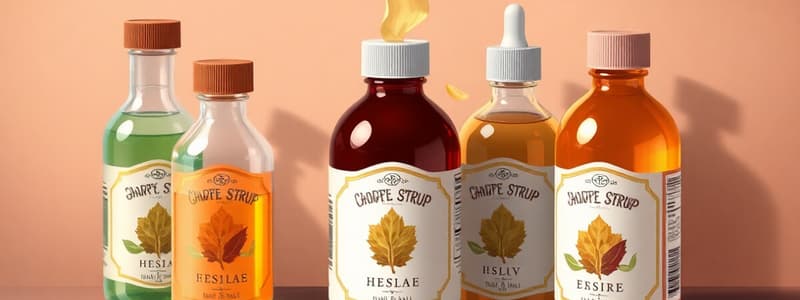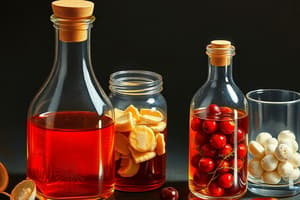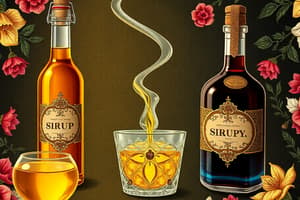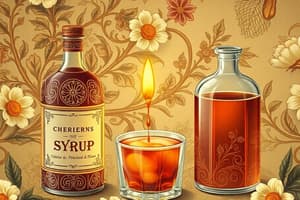Podcast
Questions and Answers
What is the main purpose of nonmedicated syrups?
What is the main purpose of nonmedicated syrups?
To serve as pleasant-tasting vehicles for administering medicinal substances.
How are medicated syrups prepared?
How are medicated syrups prepared?
They are prepared using components like sucrose, purified water, flavoring agents, coloring agents, and the therapeutic agent.
Why are syrups particularly beneficial for children and the elderly?
Why are syrups particularly beneficial for children and the elderly?
Because they provide a pleasant means of administering disagreeable-tasting drugs that may be difficult to swallow in solid forms.
What are the key components that determine the selection of a liquid dosage form for compounding?
What are the key components that determine the selection of a liquid dosage form for compounding?
Identify two types of syrups and their specific characteristics.
Identify two types of syrups and their specific characteristics.
What role do coloring agents play in medicated syrups?
What role do coloring agents play in medicated syrups?
What types of drugs can be effectively added to flavored syrups?
What types of drugs can be effectively added to flavored syrups?
Explain the significance of using simple syrup in the formulation of flavored or medicated syrups.
Explain the significance of using simple syrup in the formulation of flavored or medicated syrups.
What role does sucrose play in syrup formulations, and why is it typically favored over other sugars?
What role does sucrose play in syrup formulations, and why is it typically favored over other sugars?
Can you explain the significance of using antimicrobial preservatives in syrups?
Can you explain the significance of using antimicrobial preservatives in syrups?
What are some benefits of incorporating cellulose derivatives like methylcellulose in syrup formulations?
What are some benefits of incorporating cellulose derivatives like methylcellulose in syrup formulations?
How do flavorants contribute to syrup formulations, and why are they important?
How do flavorants contribute to syrup formulations, and why are they important?
Why might a syrup prepared for diabetic patients utilize non-glycogenetic substances?
Why might a syrup prepared for diabetic patients utilize non-glycogenetic substances?
Discuss the relationship between syrup concentration and microbial stability.
Discuss the relationship between syrup concentration and microbial stability.
In what ways do thickeners affect the therapeutic efficacy of antitussive syrups?
In what ways do thickeners affect the therapeutic efficacy of antitussive syrups?
What factors must be considered when choosing a sugar or sugar substitute for syrup formulations?
What factors must be considered when choosing a sugar or sugar substitute for syrup formulations?
Explain how the composition of syrups affects their pharmaceutical properties.
Explain how the composition of syrups affects their pharmaceutical properties.
What is the role of colorants in syrup formulations?
What is the role of colorants in syrup formulations?
What is the composition of Syrup, NF in terms of sucrose and water?
What is the composition of Syrup, NF in terms of sucrose and water?
Why is additional preservation necessary for some types of syrups?
Why is additional preservation necessary for some types of syrups?
What role does specific gravity play in the formulation of Syrup, NF?
What role does specific gravity play in the formulation of Syrup, NF?
How does the slight excess of water in Syrup, NF contribute to its properties?
How does the slight excess of water in Syrup, NF contribute to its properties?
What is the consequence of oversaturation of sucrose in syrup storage?
What is the consequence of oversaturation of sucrose in syrup storage?
Explain why Syrup, NF does not require preservatives when used soon after preparation.
Explain why Syrup, NF does not require preservatives when used soon after preparation.
What is the solubility of sucrose in water as mentioned in the context?
What is the solubility of sucrose in water as mentioned in the context?
Identify one method employed in the preparation of different syrups.
Identify one method employed in the preparation of different syrups.
Why is the excess water in Syrup, NF not favorable for microbial growth?
Why is the excess water in Syrup, NF not favorable for microbial growth?
What is the primary reason for using heat in the preparation of syrups?
What is the primary reason for using heat in the preparation of syrups?
What happens to sucrose when excessive heat is applied during syrup preparation?
What happens to sucrose when excessive heat is applied during syrup preparation?
Why is the presence of acids significant during the heating process of syrup preparation?
Why is the presence of acids significant during the heating process of syrup preparation?
What are the consequences of preparing syrup at too high a temperature?
What are the consequences of preparing syrup at too high a temperature?
Explain the term 'invert sugar' in the context of syrup preparation.
Explain the term 'invert sugar' in the context of syrup preparation.
Identify a method to prevent the loss of flavor when adding heat-labile substances to syrup.
Identify a method to prevent the loss of flavor when adding heat-labile substances to syrup.
What is the advantage of using boiled purified water in syrup preparation?
What is the advantage of using boiled purified water in syrup preparation?
What is the importance of adjusting the final volume of syrup after cooling?
What is the importance of adjusting the final volume of syrup after cooling?
Why is the agitation method preferred over heat in syrup preparation?
Why is the agitation method preferred over heat in syrup preparation?
What should be done to solid agents before adding them to a syrup?
What should be done to solid agents before adding them to a syrup?
What are the two methods mentioned for preparing syrup using percolation?
What are the two methods mentioned for preparing syrup using percolation?
What issues can arise from syrup decomposition due to overheating?
What issues can arise from syrup decomposition due to overheating?
Describe the role of agitation without heat in syrup preparation.
Describe the role of agitation without heat in syrup preparation.
How does the preparation of syrup by percolation differ from using heat?
How does the preparation of syrup by percolation differ from using heat?
How can undesirable alcohol-soluble components from medical liquids be removed?
How can undesirable alcohol-soluble components from medical liquids be removed?
Flashcards are hidden until you start studying
Study Notes
Syrups
- Aqueous concentrated preparations of sugar or sugar substitute, with or without flavoring agents and medicinal substances.
- Nonmedicated syrups are used as flavored vehicles.
- Medicated syrups are used for therapeutic purposes.
Components of Syrups
- Sugar: sucrose or sugar substitute provides sweetness and viscosity.
- Antimicrobial preservatives: prevent microbial growth.
- Flavorants: provide pleasant taste.
- Colorants: enhance visual appeal.
- Solvents: used to dissolve ingredients.
- Solubilizing agents: aid in the dissolution of poorly soluble ingredients.
- Thickeners: increase viscosity.
- Stabilizers: enhance shelf-life and prevent degradation of ingredients.
Sucrose- and Non-Sucrose-Based Syrups
- Most syrups use sucrose as the primary sugar.
- Other sugars or substances like sorbitol, glycerin, and propylene glycol can be used in special cases.
- Nonglycogenetic substances like methylcellulose or hydroxyethylcellulose are used for diabetic patients.
- Cellulose derivatives provide viscosity, sweetness, and mask the taste of medications.
Preparation of Syrups
- Methods:
- Solution with the Aid of Heat:
- Sugar is dissolved in purified water with heat.
- Suitable for heat-stable components.
- Solution by Agitation Without the Aid of Heat:
- Sugar and other components are dissolved in purified water by stirring.
- Addition of Sucrose to a Medicated Liquid or Flavored Liquid:
- Sucrose is added to a pre-prepared medicated liquid.
- Percolation:
- Either sucrose or the source of the medicinal component is percolated to obtain a syrup.
- Solution with the Aid of Heat:
Solution With the Aid of Heat
- Fastest preparation method, but care should be taken to avoid excessive heat.
- Heat can cause inversion: sucrose hydrolyses into dextrose and fructose, resulting in increased sweetness and darkening.
- Overheating can lead to caramelization, making the syrup unstable and vulnerable to microbial growth.
- Boiled purified water can improve syrup stability.
- Preservatives can be added to prevent degradation.
Solution by Agitation Without the Aid of Heat
- Slower process, but minimizes the risk of sucrose inversion, leading to greater stability.
Addition of Sucrose to a Medicated Liquid or Flavored Liquid
- Use this method for incorporating medicated liquids like tinctures or fluidextracts.
- Water-insoluble components are removed before adding sucrose to prevent unwanted ingredients in the final syrup.
### Percolation
- Suitable for extracting medicinal components from raw materials, including sucrose.
- Extraction is followed by adding other components to create the syrup.
Studying That Suits You
Use AI to generate personalized quizzes and flashcards to suit your learning preferences.




